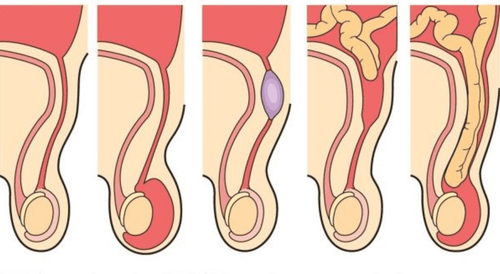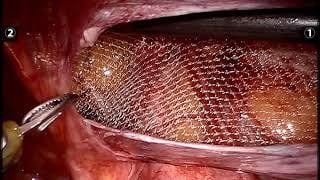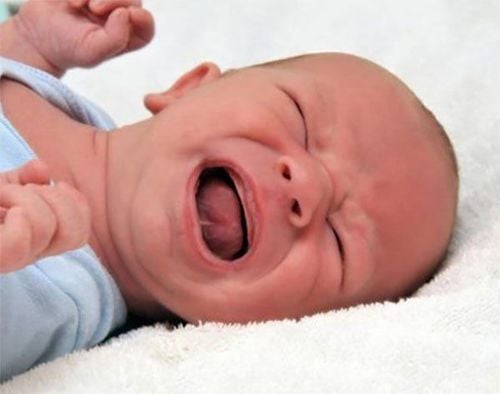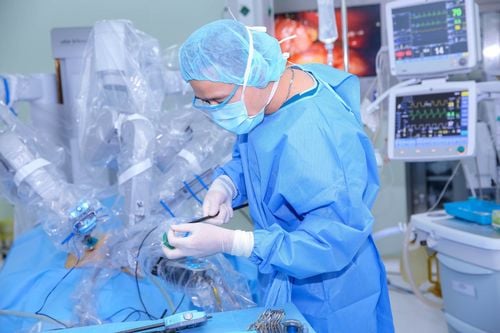This is an automatically translated article.
To thoroughly treat inguinal hernia, it is necessary to have surgical intervention to completely cure it and avoid dangerous complications caused by the disease. However, when surgery is very rare, complications can still occur depending on many factors. The disease can recur, but if the risk factors are well controlled, the risk of recurrence will be reduced.
1.Can inguinal hernia recur after surgery?
Inguinal hernia is a condition where the organs in the abdomen through the position of the abdominal wall are weakened or there are natural holes in the groin area coming out of the abdomen.
There can be 2 types of inguinal hernia including congenital and acquired inguinal hernia:
Congenital inguinal hernia : Occurs because the testicular duct was not closed after the baby was born. As a result, the internal organs in the abdomen can come out of the abdomen into the peritoneal foramen. The bigger the hole, the easier it is for the internal organs to fall, and the sooner the disease is revealed. The disease can appear very early but can also appear late into adulthood. However, it does not mean that every testicular canal will have an inguinal hernia. Acquired hernia: The disease is formed because the abdominal wall is weakened by the process of heavy labor, due to lack of nutrition...
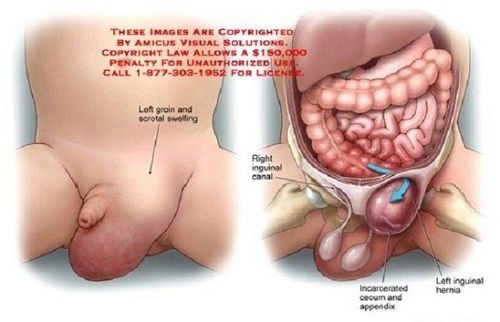
Hình ảnh: thoát vị bẹn nhìn từ bên ngoài và bên trong
Although surgery for inguinal hernia is mostly very low risk. However, there may still be a recurrence rate after surgery, with about 2% of patients after surgery for inguinal hernia relapse after 3 years. Because even though surgery to correct the disease, but the factors that contribute to the disease are still the same, push a lot, exertion, work hard... It still causes an increase in intra-abdominal pressure. This is the main factor contributing to the recurrence of the disease after surgery.
In addition, a part of the factors related to the technical level of the surgeon, the patient's geographical factors... Also related to the risk of complications after surgery.
Therefore, it is advisable to choose reliable places to conduct surgery and after surgery, it is necessary to control well the risk factors for recurrence of the disease. This can reduce the risk of recurrence after surgery.
2.Inguinal hernia surgery methods
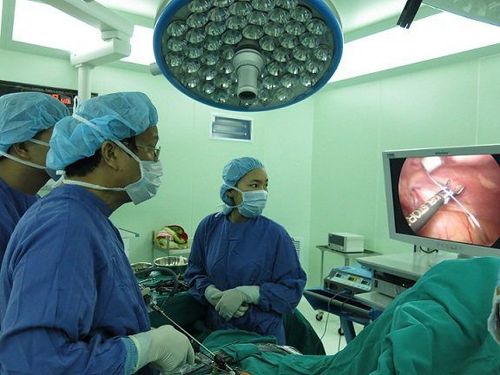
Phẫu thuật nội soi điều trị thoát vị bẹn cho bệnh nhân
Currently patients with inguinal hernia can be treated with open surgery or laparoscopic surgery. Depending on the patient and the medical condition, the doctor prescribes the appropriate surgical method.
Open surgery: The patient is made an incision of about 3cm in the groin area, exposing the hernia sac, then sutured to seal the position of the hernia tube or can put additional mesh to avoid recurrence. Laparoscopic surgery: The treatment principle of this method is similar to open surgery. But in laparoscopic surgery, the doctor will make a few very small incisions in the abdomen to put the laparoscope and instruments inside to process the hernia. The endoscope with a camera and light source will help the doctor see the whole inside and conduct surgical operations. Thus, laparoscopic surgery has the advantage of small incisions, less invasiveness, less recovery time and hospital stay, and higher aesthetics. In general, surgical treatment of inguinal hernia is necessary to avoid complications. But there are some hernias in the elderly, which have a low rate of hernia strangulation that can be monitored without surgery.
3. Diet after surgery

Sau khi mổ người bệnh nên ăn đủ chất xơ để tránh táo bón
After surgery, the patient should have a suitable regimen to avoid the risk of complications
After surgery, you should walk gently to avoid blood clots and increase nutrition to the surgical site for quick wound healing. Avoid heavy labor after surgery, at least after 1 week, the patient can return to normal activities. If you work hard, it must be after at least 1 month. Patients can shower after 2 days of surgery, shower with a faucet to avoid soaking in the bath. After bathing try to keep the incision dry. Diet: The patient should not eat too much to increase pressure on the incision, eat enough nutrients, vitamins and especially eat enough fiber to avoid constipation. Drink enough water to keep the body hydrated. Follow up with the doctor's appointment, clean the incision. When the incision is stable to avoid recurrence: It is recommended to limit too much labor, eat and drink to limit constipation, control weight appropriately to avoid overweight and obesity, exercise regularly, treat thoroughly. When you have a respiratory disease, avoid smoking. In general, after surgery, patients still have a recurrence rate, depending on each subject and lifestyle, this recurrence rate is high or low. Therefore, in order to avoid recurrence, it is necessary to control the risk factors well.
Vinmec International General Hospital is a high-quality medical facility in Vietnam with a team of highly qualified medical professionals, well-trained, domestic and foreign, and experienced.
A system of modern and advanced medical equipment, possessing many of the best machines in the world, helping to detect many difficult and dangerous diseases in a short time, supporting the diagnosis and treatment of doctors the most effective. The hospital space is designed according to 5-star hotel standards, giving patients comfort, friendliness and peace of mind.
Please dial HOTLINE for more information or register for an appointment HERE. Download MyVinmec app to make appointments faster and to manage your bookings easily.





